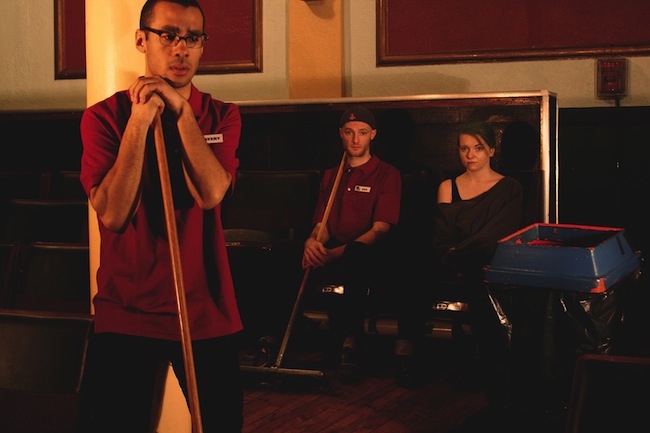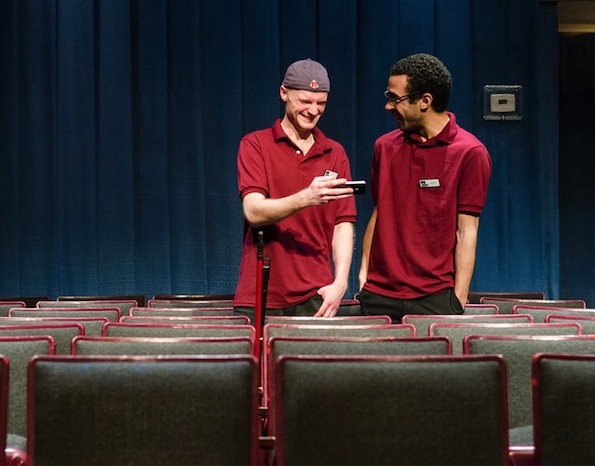Theater Review: A First-Rate “Flick” From Company One
In “The Flick,” Annie Baker creates youngish characters that my students at Boston University would call “relatable,” exploring how self-delusions, stereotypes, and fear keep them from connecting in a meaningful way.
The Flick, by Annie Baker. Directed by Shawn LaCount. Staged by Company One at the Modern Theater, Suffolk University, Boston, MA, through March 15.
By Bill Marx
I am far from convinced that Annie Baker is one of the saviors of contemporary American playwriting, but Company One’s first-rate production of The Flick has modulated by initial skepticism about her plays Circle Mirror Transformation and Body Awareness. At over two and a half hours, The Flick is too long and its ending is disappointingly pat. (Current American rule of dramaturgical thumb: do not give the audience the dignity of leaving the theater disheartened.) But the play’s genially comic narrative of the conflicts, fantasies, and isolation of the working poor, a trio of low level employees at a struggling cinema in Western Massaschusetts, is vivid, amusing, and quirky. Baker creates youngish characters that my students at Boston University would call “relatable,” and she explores, at times a bit too obviously, how self-delusions, stereotypes, and fear keep them from connecting in a meaningful way.
Baker is a leading member, theatrical division, of the American followers of Anton Chekhov. (I once entitled a review “They All Want to Write Like Chekhov.”) I bow to no one in my admiration of the Russian genius, but why can’t a few of our homegrown dramatists be inspired by Ibsen or Shaw, O’Neill or Pirandello? Before his unfortunate foray into TV, Jon Robin Baitz made noises about being an updated Arthur Miller. Why won’t anyone dare dip his or her toe into Modernism? Is it that producers will not mount plays that challenge realism? The late 19th-century appeal of Chekhov to contemporary playwrights and audiences is clear: his demand for ambiguity and impressionistic nuance, use of small dramatic gestures to drive the action, vision of how venial sins are more destructive than large crimes, and perception of bourgeois life as a rich muddle of laughter and tears, tragedy and comedy.
Unfortunately, our version of Chekhov is often a bowdlerized version of the master. In the marvelous story “Gooseberries,” the narrator comes to the following inspiring realization (in the Ronald Wilks translation): “While we are still young, strong, and healthy never stop doing good. Happiness doesn’t exist, we don’t need any such thing. If life has any purpose meaning or purpose you won’t find it in happiness but in something more rational, in something greater. Doing good!” Chekhov is in earnest here. American plays tend to treat the misery and corruption of the world outside of the theater with extreme reluctance. We are still searching for happiness (or buzz words like security or community) and ritually weeping at its impossibility. Thus the figures in The Flick yearn for personal contentment: their goal is to break through social and psychological barriers, to find the faith in themselves to reach out to others. We are in self-actualization territory, and I wish our dramatists would break out.

Peter Andersen, Alex Pollock, and Brenna Fitzgerald in the Company One production of “The Flick.” Photo: Lisa Voll.
That said, The Flick is a beguiling example of the genre. The Cherry Orchard-inspired context of overarching cultural change and loss is supplied by the plot point that the movie house is being sold, its 35 mm projector to be junked in order to make way for standard digital projection. Avery, an African-American student on leave from Clark University, comes to work at the cinema (partly because he feels strongly about the endangered virtues of 35 mm projection), helping to sweep up post-show popcorn with Sam, a thirty-something employee who has a thing for the flirty projectionist, Rose.
What initially looks like a daisy chain of romantic yearning (Rose has eyes for Avery rather than Sam) becomes blessedly more complicated as we learn about the troubled domestic backgrounds of Sam and Avery. The latter is also dealing with challenging psychological issues. The introduction of issues of class and loyalty — Rose is saddled with student loans, Sam is on the fast track to routine employment — help compensate for the script’s weakness for underlining its themes: an unhappy Rose and Avery talk about going though life as if they were performers, Sam is in love with a romantic image. The artistic price paid for changes in film making and projection is not seriously examined; these transformations essentially serve as a humorous background to the attempts of the characters to become friends and lovers. There is an amusing, if sentimental, use of the Six Degrees of Separation game, and a few hilarious exchanges about what people leave on the floor of movie theaters.
Baker works out the trio’s conversations and tentative comminglings with agile humor and deadpan verve. Alex Pollock makes the most of Sam, the actor’s eccentric body language and speech patterns creating a figure of surprisingly poignant depth. As Avery, Peter Andersen is at first a bit too eagerly callow, but his performance grows over the course of the evening, becoming less an exercise in one-note jitteriness. Brenna Fitzgerald’s Rose is an adroit mix of bluster and vulnerability. Cristina Todesco’s movie auditorium is convincingly ramshackle; Edward Young’s sound design serves up the necessary lilt and bombast. Shawn LaCount’s direction sometimes highlights Baker’s annoying habit of making sure audience members get the dramatic point (rather than trusting them to figure it themselves). This is an overlong but pretty good Flick — I just wish that the script bucked the standard Chekhovian formula.
Bill Marx is the Editor-in-Chief of The Arts Fuse. For over three decades, he has written about arts and culture for print, broadcast, and online. He has regularly reviewed theater for National Public Radio Station WBUR and The Boston Globe. He created and edited WBUR Online Arts, a cultural webzine that in 2004 won an Online Journalism Award for Specialty Journalism. In 2007 he created The Arts Fuse, an online magazine dedicated to covering arts and culture in Boston and throughout New England.


